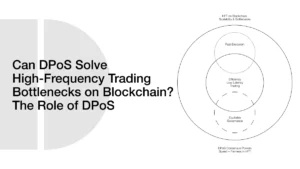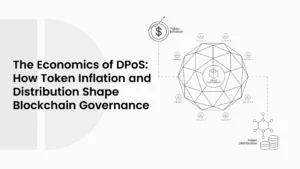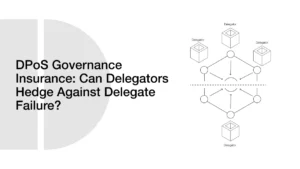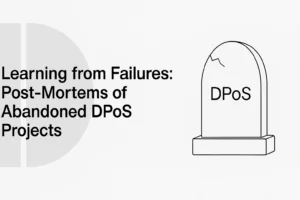All You Need to Know About DPoS Node Requirements
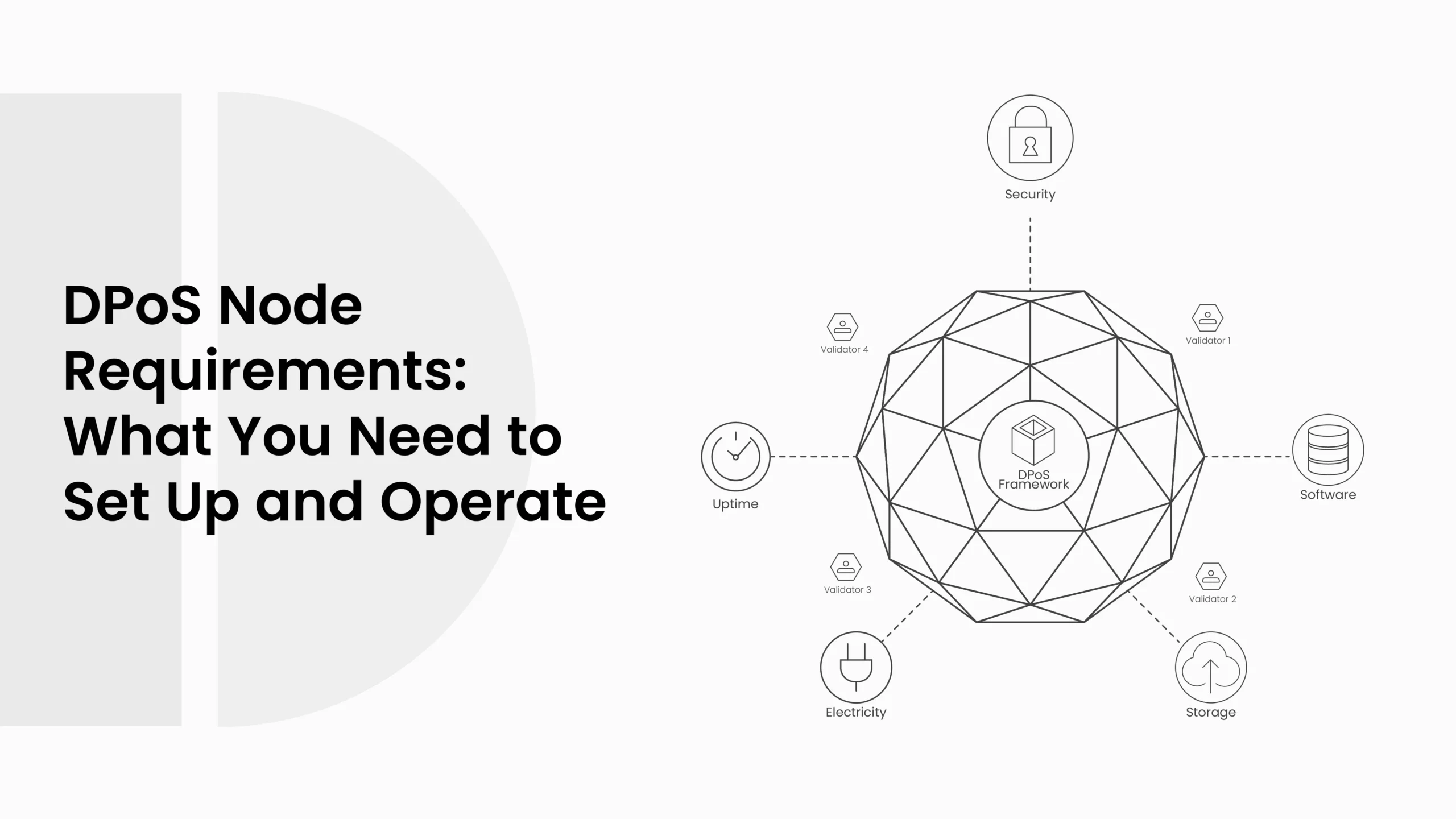
Delegated Proof of Stake (DPoS) is a type of blockchain system that enhances its speed, scalability, and efficiency. Unlike Proof of Work (PoW), which needs heavy mining, or simple Proof of Stake (PoS), DPoS uses a voting system based on trust. A small number of elected delegates, also known as validators, are selected to create new blocks and maintain the network’s security. But the big question is, what do you actually need to run one of these nodes?
- What Is a DPoS Node?
- The Stake and Voting Layer in DPoS
- Technical Hardware Requirements for DPoS Nodes
- Software Stack and Node Configuration
- Security and Operational Responsibilities
- Economic Incentives and Costs
- Final Thoughts
- Frequently Asked Questions About DPoS Node Requirements
- What is a DPoS node?
- What hardware is needed for a DPoS validator?
- Do validators need to stake tokens?
- How do validators earn rewards?
- What happens if a validator node goes offline?
- Glossary of Key Terms
This article examines the comprehensive set of DPoS node requirements, encompassing hardware specifications, software setup, staking obligations, and operational responsibilities, for individuals interested in participating in the governance and validation process of a DPoS-based blockchain.
ALSO READ: Can DPoS Be Hacked? Your Ultimate Guide to Risks and Security
What Is a DPoS Node?
A DPoS node is normally a full validator or block producer node, which is involved in the validation, proposal, and creation of blocks. Such nodes are not selected at random as in PoS, but are voted on by token owners. They are expected to keep the network online, ensure security, verify transactions, and generate blocks in a predetermined round-robin manner, once elected.
The number of validator nodes is typically limited (e.g., 21 in EOS, 27 in TRON), which increases throughput but also concentrates responsibility.
The Stake and Voting Layer in DPoS
At the heart of DPoS is a democratic staking and voting model. To be an active node, an operator has to first campaign to win token holders. This implies that voters assign their interests to candidates of their choice, and the former are then ranked and chosen according to the voting weight they are given. The greater the stake that a node accumulates, the greater the likelihood that it will be elected as a block producer.
This structure means running a node is not just a technical activity; it is also political and social. People who run DPoS nodes usually need to do more than just keep servers online. Often, they must establish a name or brand, engage with the community, remain transparent about their activities, and even share some of their rewards to maintain voter support. In most blockchains, the voting never really stops. A node can be voted out just as fast as it got voted in. That’s why keeping the community happy is just as important as keeping the system running.
Technical Hardware Requirements for DPoS Nodes
To stay strong and competitive, validator nodes need good hardware. They don’t require as much power as mining machines, but they must stay online continuously, without interruption, throughout the day and night. These machines must be fast enough to handle a large number of transactions quickly. If there is downtime, lag, or missed blocks, the network can slow down, and the operator may lose rewards or even the trust of the voters.
Typically, a node consists of a multi-core processor, a substantial amount of memory (typically 16 to 32 GB), and fast solid-state storage. This is particularly true where the networks have high-throughput transactions; I/O latency or bottlenecks can lead to performance degradation. It also needs a stable, high-bandwidth internet with low latency. Even a single round of block production loss caused by downtime may cause a node to lose its election. This is why most validators either buy redundant servers or use cloud computing, which has automated failover and monitoring.
ALSO READ: The Economics of DPoS: How Token Inflation and Distribution Shape Blockchain Governance
Software Stack and Node Configuration
Installing and configuring the node software is a core part of the setup process. Each DPoS blockchain provides a specific client, such as EOS’s nodeos or TRON’s FullNode Java client, that must be installed, synced with the blockchain, and configured correctly. The configuration process is used to create peer-to-peer networking, block production schedules, secure private key signing blocks, and interfere with APIs or block explorers.
First connection to the blockchain may require a lot of time, as on the length of the chain. There are projects with snapshots or fast-sync solutions, although even in that case, the procedure needs technical accuracy and debugging. After being synced, the validator has to be registered and, in certain networks, bonded with a minimum deposit or token stake. Failure to correctly sign and propagate blocks in accordance with the protocol rules may lead to removal or temporary suspension from the validator set.
Keeping software updated is also critical. DPoS chains often undergo frequent upgrades, and validator nodes must implement protocol changes promptly. Falling behind on version updates can disconnect a node from the network or cause consensus errors, potentially damaging reputation or causing slashing in hybrid PoS-DPoS systems.
Security and Operational Responsibilities
Security is a paramount concern for any DPoS validator. As these nodes handle block production and carry signing keys, they are prime targets for attackers. A single compromised node might pose a threat to the stability of the network or malicious block propagation. Thus, the majority of practiced operators use strict access controls, firewalls, intrusion detection systems, and secure key management behaviors, including offline key storage or hardware module block signing.
The work of operations is not limited to the running of software. Operators of the nodes have to be vigilant to ensure that they are online, confirm that their blocks are being accepted, and react to any network notifications. Most of them resort to monitoring software such as Prometheus, Grafana, or home-written scripts to monitor key metrics. In certain chains, the failure to produce valid blocks or produce blocks that are missing may lead to financial punishment or automatic disqualification.
ALSO READ: What are Block Producers in DPoS? An Ultimate Guide to their Roles and Incentives
Moreover, validators are expected to participate in network governance. This includes voting on protocol upgrades, smart contract changes, and economic policies. The role of the node is not just technical but also legislative in maintaining the evolution and health of the ecosystem.
Economic Incentives and Costs
The financial incentive to operate a DPoS validator node is usually the purpose of the financial gain. The block producers are paid in newly minted tokens or transaction fees, which can be quite large in busy chains. But the market is fierce, and the initial and continued expenses are high.
The infrastructure costs involved are server rental or purchase, backup systems, monitoring software, and security tools. Beyond that, node operators frequently make investments in community outreach, the creation of websites, social campaigns, or voter incentives. These marketing activities, in most cases, are very important to acquire and retain votes, particularly in ecosystems whose set of validators is updated regularly.
Opportunity cost of holding and locking up a large sum of tokens is also there, especially in networks that need self-staking or bonding. This is a high-risk, high-effort project because validators who fail to match the performance demands (or lose favor in the community) may not be able to recoup their costs.
ALSO READ: How to Choose the Right Delegate or Validator in a DPoS System
Final Thoughts
Delegated Proof of Stake node setup and operation is a complex task that requires both technical skills and social reputation. The installation of software and hoping to get rewards is insufficient. Validators must be prepared to engage with the community, maintain an infrastructure of enterprise scale, and invest in building and maintaining the network security and development.
However, to the winners, the position comes with a lot of power and long-term rewards. With the emergence of new DPoS-based networks and the increasing demand for high-performance consensus, node operators who invest in powerful infrastructure early and rely on reputation-building campaigns to promote themselves to users can become the core of the future of decentralized governance.
Frequently Asked Questions About DPoS Node Requirements
What is a DPoS node?
A DPoS node, sometimes called a validator or block producer, is a person or team that gets elected to check transactions, make new blocks, and help keep the blockchain safe.
What hardware is needed for a DPoS validator?
For hardware, most validators use strong computers with multi-core CPUs, 16 to 32 GB of RAM, and fast SSD storage. They also need a very stable internet that is quick and doesn’t lag. Many set up extra servers or cloud systems as backup, so if one goes down, the other keeps working.
Do validators need to stake tokens?
Yes. Validators usually need to stake or bond tokens. Their voting power and eligibility often depend on token holder support and community delegation.
How do validators earn rewards?
Rewards typically come from transaction fees or newly minted tokens. In many cases, validators share rewards with delegators to attract more votes.
What happens if a validator node goes offline?
If a validator misses blocks or suffers downtime, it can lose rewards, voter support, or even be removed from the active set in some DPoS systems.
Glossary of Key Terms
- DPoS (Delegated Proof of Stake): A consensus system where token holders vote for a limited set of validators to maintain the blockchain.
- Validator / Block Producer: The elected node that validates transactions and produces blocks.
- Delegator: A token holder who votes for validators and may share in their rewards.
- Staking / Bonding: Locking tokens as collateral to support validators and secure the network.
- Slashing: Penalties applied when validators act maliciously or fail to meet performance standards.
- Failover Server: A backup server that takes over if the main validator node goes offline.
- Uptime: The percentage of time a validator is active and producing blocks without downtime.

